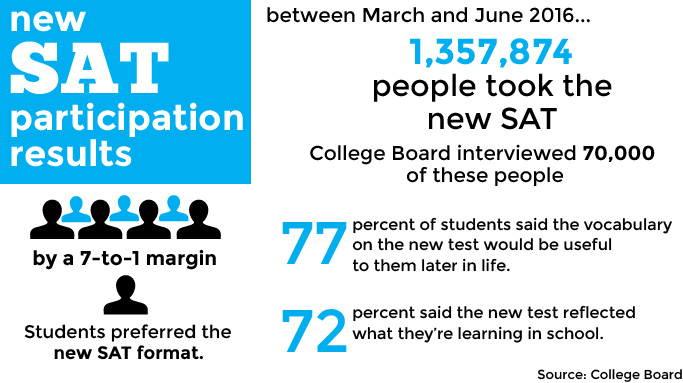
Students who took the new SAT this spring said they preferred the new format over its previous format, according to a College Board report released Tuesday.
Almost 1.36 million people took the new SAT between March and June 2016, and based on the responses of the 70,000 student who the College Board surveyed, students said the new format is better by a 7-to-1 margin, according to the report.
“The new SAT and the old SAT are two different tests and are based on different specifications,” a spokesperson from the College Board wrote in an email. “For example, a score of 520 on the math section of the old SAT is not equivalent to a score of 520 on the new SAT’s math section because each section tests a different domain of knowledge and skills.”
The new SAT came to light when the College Board announced in March of 2014 that it would redesign the SAT into a model that is more relevant to high school curriculum. The first wave of high schoolers took the redesigned test this spring.
As high school students who took the new SAT start to apply for college, Boston University spokesman Colin Riley said it’s too early to make any assumptions about how the university may alter its admission processes to accommodate the new test.
“It’s premature to make any determination or judgement on what could change, but since [the SAT] is not something that is necessarily a determinant factor in the admissions process, I know admissions will learn more as the years go on,” Riley said.
Riley also said BU prioritizes a student’s GPA and academic standing over standardized test scores.
“[The SAT] is a test that’s usually taken on a single day, so of course, we deemphasize the importance of it because it probably creates a lot of stress for students and parents,” Riley said. “While we do require standardized tests, we are clear that the most important thing are an academic transcript, success, achievement level, and that the applicant has challenged themselves.”
Hardin Coleman, the dean of the School of Education, said the new SAT will not solve the problem of not being the fairest assessment of students because it allows for an economic advantage.
“We know that whatever the College Board does to reorganize the SAT, your scores can be predicted by your zip code,” Coleman said. “The wealthier the neighborhood you live in, the better you’ll do on the SATs, and that’s not necessarily an assessment of your ability to perform well in college.”
Coleman said the new SAT may result in more problems because it is a more complex assessment.
“Once you’re measuring a more complex set of skills, there will be more variance in how it gets evaluated,” Coleman said. “As you create more variance in the situation, you’re more likely to have false positives or negatives.”
As for current BU students, many seemed to share similar views on their own SAT experiences.
Isabel Stevenson, a sophomore in the College of Arts and Sciences, said universities should focus on grades instead of test scores.
“GPA should be most important in the admissions process,” Stevenson said. “Grades are something you can learn from and improve upon over time.”
Griffin Di Stefano, a sophomore in the College of Engineering, said he didn’t want to be judged by the results of a single test.
“Overall, I didn’t like the process,” he said. “I hated taking one test and having such a defining number. That number is only a short snapshot of what I can do.”
Shalini Ramaswamy, a sophomore in the College of Communication, said the SAT still does not accurately represent a student’s academic ability.
“[Standardized tests] geared towards a very specific type of person,” Ramaswamy said. “If you don’t study that way or learn that way, the test is not going to work in your favor. That happened to me.”

